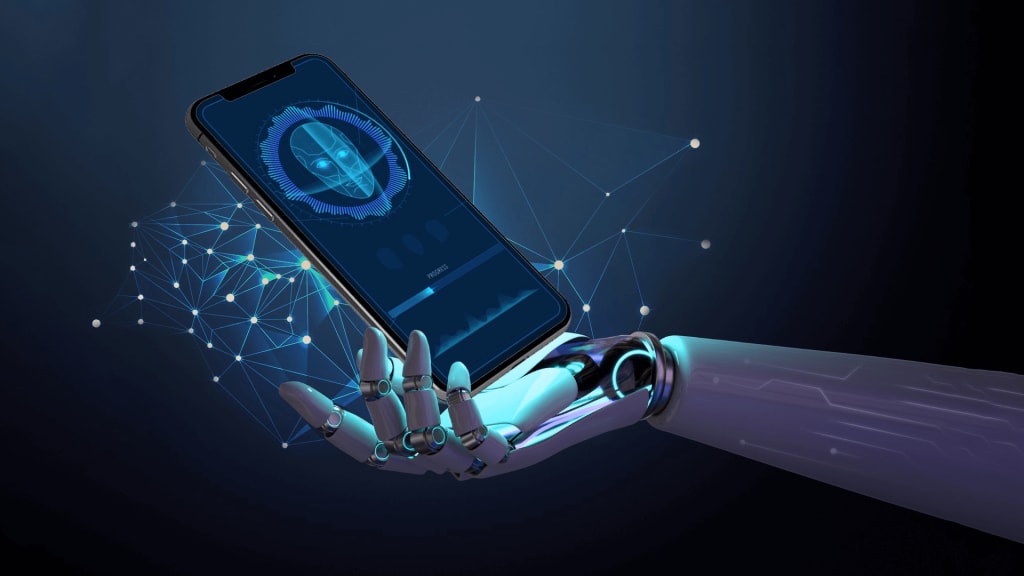AI in Mobile App Development: Shaping the Future of Technology
Explore the future of AI in mobile app development. Discover trends, challenges, and innovations. Ready to create your AI-powered app? Contact Addevice now.

In today's rapidly evolving landscape of mobile app development, one technology stands out as a game-changer: Scientists have employed the data they gather to develop Artificial intelligence (AI) models that can better learn react to, and make appropriate decisions regarding such problems as traffic gridlock, health care allocation, and environmental conservation. Reshaping apps, their features and indisputable role in mobile devices is not just an immeasurable marketing tool, but a real transformation that lies in the fact that apps are not what they used to be. We can now have applications that can learn and change, thus giving individuals a chance to interact in a more appropriate and pleasing way across different spheres.
The primary challenge posed by the AI revolution in mobile app development
Imagine an app for mobile devices that not only comprehends but also foresees users' preferences in a way users tend to be offered with an interface more individualized and smooth. These are the speech capabilities of artificial intelligence in mobile application development. Unlike programming just with a machine, AI lets the apps continuously grow through the interactions people make and, so, gives them a chance to provide the user with personalized results.
Virtual assistive AI is an example of AI with which mobile application developers deal in real-time while predictive algorithms optimizing logistics are another facet of it. For logistics, the AI has brought unprecedented efficiencies through smart routing, forecasting demand fluctuations, and an overall output increase. The world wide mobile AI market is totally impossible without a continuous increase unless forecasts of 84 USD billion can be achieved. 80 billion by 2030. This shows the portion of mobile application development that is going to be run by artificial intelligence.
Implementation of AI in Daily Living through Mobile Applications
AI-enhanced customer segmentation is a core function of mobile apps. Through users’ feedback and insights, apps can come to know preferences and behaviors well and give different experiences correspondingly. Let us say Netflix and Spotify networking services that use AI to recommend individual content following what interests users best are being paid for AI.
Virtual assistance and chatbots, which are fuelled by AI, are the major causes of the transformation of user interaction. From Siri to Google Assistant, these assistants hold up the natural language processing algorithms and put them to real-time use which gives the information that is needed. The bot in logistics apps is specifically used for fast communication processes and offers shipment information during the logistics operations.
Predictive analytics licensing power and AI now very mobile applications are capable of providing information that guesses the users’ needs and enhances their performance. AI consists of algorithms that study one's spending and give holistic planning recommendations which are very useful. In logistics, forecasts use predictive analytics to find shortest routes and predict missed opportunity of demand variations that enable the supply chain to run smoothly.
Intelligence and voice recognition are few other functionalities based on AI in mobile apps. If you have used a fascinated filter through a camera app or asked a voice commander to help in a navigation app, you have experienced how AI refines the user experience and makes the opportunities for innovative functionalities.
AI in mobile apps development now
AI integration in mobile app development transforms user experiences, enhances functionality, and boosts efficiency:
- Personalization: AI if used correctly it can read the user's behavior and platform just like Netflix provides customized experiences.
- Virtual Assistants: AI applied by Siri and Google Assistant for natural language processing gives the user the option to use and see the dialogue between both user and the machine.
- Predictive Analytics: It is AI that issues user requirements orders, enabling dynamics in route optimization in logistics apps and assists with financial planning.
- Image and Voice Recognition: As a part of AI, facial and voice recognition does this function more efficient and allows functions that previously didn't exist.
- AR and VR: AI infused AR/VR technologies are unlocking unprecedented in-game experience beside those in logistics management.
- Fraud Detection: AI algorithms are able to distinguish between extraordinary spending patterns and normal customers in banking applications; they provide security of transactions in the banks.
- Enhanced User Experiences: Basically AIproof apps are cognition-based, adaptive, and individualized to the user hence meeting their needs in addition to improving the working efficiency.
Case Studies: The Question of Ethics
Several successful case studies demonstrate the transformative power of AI in mobile app development:
- Spotify: AI personalized music advice determined by algorithms led to a growing effect on engagement and sales.
- Starbucks: This AI-led customer engagement has boosted app usage leading to an increase in the sales of the targeted products.
- Snapchat: They can entertain, educate, and sell, making possible more user interactions and thus, higher revenue from advertising.
- Duolingo: The adaptive learning, established by AI, enables better user retention and mastery of tasks.
- Uber: AI-powered predictive analytics improved the efficiency and the revenue which makes the company to stand out among the rest.
A vivid illustration of AI impact on industries can be seen in these case studies that depict the practical value of AI implementation across different industries like entertainment and transport.
AI Trends that Will Appear in Mobile Interaction
The future of AI in mobile apps promises even more exciting innovations:
- AI-powered customization will revolutionize the way consumers experience digital entertainment, providing them with tailor-made content recommendations and interfaces.
- Voice-based interfaces are going to be ever-present, helping users interact easily and thus leads to fundamentally different relationships between people and machines.
- AI will be an auxiliary tool to expand the user experience, equipping it with real-life context and immersion alike.
- Robots will be able to help manage cybersecurity and strengthen data protection and menace detection measures.
Challenges and Ethical Considerations
Although AI seems beneficial in app development, these types of technology also pose ethical concerns like algorithm bias, privacy, lack of accountability, and informed consent. Solving these issues demands a process of honest communication, making ethical decisions from the outset, using different training data sets, and coming up with a user empowerment.
Conclusion
AI is spearheading mobile application development in the language of technology, thus opening the door to the future. This impact pushes boundaries of technologies, creating a borderless world where information is gained and utilized with utmost convenience. The advent of AI brings keystone ethical considerations as we move into this arena. It is paramount that we responsibly navigate the ethical ramifications of AI mobile applications to ensure that they are not just innovative but also ethical, user-friendly and inclusive. the appropriate AI will further change the application app, which will result in the acquisition of the objective experience and individual approach to all the mobile device users. Learn more about The Future of AI in Mobile App Development.






Comments
There are no comments for this story
Be the first to respond and start the conversation.